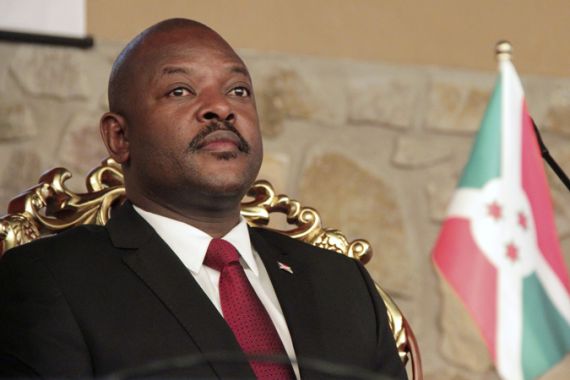Burundi expels UN official over arms report
UN security chief to be expelled after report said government was arming young supporters ahead of elections.

Burundi’s foreign ministry has said it ordered a top United Nations official out of the country after a report claimed the government was arming young supporters ahead of elections.
Paul Debbie, security chief at the UN office in Burundi, on Thursday was ordered to leave the country by Friday, Foreign Minister, Laurent Kavakure, said.
I can assure you that any action to bring about war in general, and to commit genocide in particular, cannot be tolerated.
The expulsion was in connection to a UN report containing “allegations of weapons distribution to members of the youth league of the ruling party”, Kavakure told the AFP news agency, saying it had undermined the “image of Burundi” and was a “false rumour.”
The small central African nation is still healing from decades of conflict, and is growing increasingly tense in the run-up to presidential elections in 2015, when President Pierre Nkurunziza is expected to campaign for a third term in office despite a two-term constitutional limit.
Local media have been quoting from what is alleged to be a leaked internal UN report.
It alleges that members of the Imbonerakure, the youth wing of Nkurunziza’s party, are being armed and trained in weapons use, raising fears of a return to civil war, even of genocide.
Vice President Prosper Bazombanza on Tuesday demanded the UN either provide evidence or retract the report, dismissing the concerns it raised.
“I can assure you that any action to bring about war in general, and to commit genocide in particular, cannot be tolerated,” Bazombanza said in a broadcast on state radio late on Tuesday.
Diplomats criticised the expulsion of the diplomat.
“This does not solve the real problem raised by these allegations,” one said, noting that Burundi has refused UN calls for an independent probe into the reports.
Civil war
On Wednesday, Burundi accused the UN of spreading rumours about planned constitutional changes that critics say could upset the country’s delicate ethnic power balance and possibly lead to civil war.
Government ministers said that warnings last week by the UN mission in Burundi (BNUB) about possible violence were baseless and possibly spread to justify an extension of its mandate beyond its December expiration date BNUB warned last week that leaders of tiny central African state who have manipulated young people to stoke violence could face international prosecution if human rights abuses are committed.
Also last week, the United States urged Burundi President Pierre Nkurunziza to drop the planned changes that might allow him to run for a third term. They have stirred the country’s worst political crisis since a 12-year civil war ended in 2005.